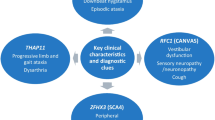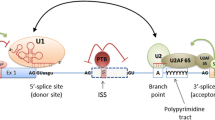Abstract
Introduction
Bartter syndrome type I (BS1) has been rarely reported in large groups. On the other hand, the phenomenon of exon skipping, in which exonic mutations result in abnormal splicing, has been reported to be associated with various diseases. Specifically, mutations that result in the disruption of exonic splicing enhancers (ESEs) and/or the creation of exonic splicing silencers (ESSs) can promote exon skipping. However, the aberrant exon skipping caused by an exonic variant in such splicing regulatory elements (SREs) sequences has never been reported in the causal gene of SLC12A1 in BS1.
Methods
We analyze the variants in nine Chinese families with BS1, including eight with antenatal BS (aBS) and one presenting as classical BS (cBS), by next-generation sequencing. Then we used bioinformatics programs to analyze all these variants found in this study and identify candidate mutations that may induce exon skipping. Furthermore, the effects of identified variants were classified according to the 2015 American College of Medical Genetics and Genomics (ACMG) standards and guidelines.
Results
Fifteen different variants of SLC12A1 gene were identified, including 11 novel ones. Two of the nine probands were homozygotes, the rest seven ones were compound heterozygotes. One candidate variant (c.1435C>G), not only significantly reduced ESEs scores but also markedly increased ESSs scores, were further investigated by mini-gene splicing assay, and found this single-nucleotide substitution causes abnormal splicing in vitro (exclusion of exon 11). Finally, among 15 variants, 9, 3, and 3 were classified as “pathogenic variants”, “likely pathogenic variants”, “variants with uncertain significance”, respectively.
Conclusion
These data would enrich the human gene mutation database (HGMD) and would provide valuable references to the genetic counseling and diagnosis of BS1 for Chinese population. Additionally, our results suggest that aberrant exon skipping is one previously unrecognized mechanism by which an exonic variant in SLC12A1 can lead to BS1.



Similar content being viewed by others
References
N. Matsunoshita, K. Nozu, A. Shono, Y. Nozu, X.J. Fu, N. Morisada, N. Kamiyoshi, H. Ohtsubo, T. Ninchoji, S. Minamikawa, T. Yamamura, K. Nakanishi, N. Yoshikawa, Y. Shima, H. Kaito, K. Iijima, Differential diagnosis of Bartter syndrome, Gitelman syndrome, and pseudo-Bartter/Gitelman syndrome based on clinical characteristics. Genet. Med. 18(2), 180–188 (2016)
E. Seys, O. Andrini, M. Keck, L. Mansour-Hendili, P.Y. Courand, C. Simian, G. Deschenes, T. Kwon, A. Bertholet-Thomas, G. Bobrie, J.S. Borde, G. Bourdat-Michel, S. Decramer, M. Cailliez, P. Krug, P. Cozette, J.D. Delbet, L. Dubourg, D. Chaveau, M. Fila, N. Jourde-Chiche, B. Knebelmann, M.P. Lavocat, S. Lemoine, D. Djeddi, B. Llanas, F. Louillet, E. Merieau, M. Mileva, L. Mota-Vieira, C. Mousson, F. Nobili, R. Novo, G. Roussey-Kesler, I. Vrillon, S.B. Walsh, J. Teulon, A. Blanchard, R. Vargas-Poussou, Clinical and genetic spectrum of Bartter ssyndrome type 3. J. Am. Soc. Nephrol. 28(8), 2540–2552 (2017)
D.B. Simon, F.E. Karet, J.M. Hamdan, A. DiPietro, S.A. Sanjad, R.P. Lifton, Bartter’s syndrome, hypokalaemic alkalosis with hypercalciuria, is caused by mutations in the Na–K–2CI cotransporter NKCC2. Nat. Genet. 13(2), 183–188 (1996)
G.R. Ares, P.S. Caceres, P.A. Ortiz, Molecular regulation of NKCC2 in the thick ascending limb. Am. J. Physiol. Ren. Physiol. 301(6), F1143 (2011)
P.G. Starremans, F.F. Kersten, N.V. Knoers, L.P. van den Heuvel, R.J. Bindels, Mutations in the human Na-K-2Cl cotransporter (NKCC2) identified in Bartter syndrome type I consistently result in nonfunctional transporters. J. Am. Soc. Nephrol. 14(6), 1419 (2003)
W. Ji, J.N. Foo, B.J. O’Roak, H. Zhao, M.G. Larson, D.B. Simon, C. Newton-Cheh, M.W. State, D. Levy, R.P. Lifton, Rare independent mutations in renal salt handling genes contribute to blood pressure variation. Nat. Genet. 40(5), 592–599 (2008)
L. Cartegni, S.L. Chew, A.R. Krainer, Listening to silence and understanding nonsense: exonic mutations that affect splicing. Nat. Rev. Genet. 3(4), 285–298 (2002)
C. Heintz, S.F. Dobrowolski, H.S. Andersen, M. Demirkol, N. Blau, B.S. Andresen, Splicing of phenylalanine hydroxylase (PAH) exon 11 is vulnerable: molecular pathology of mutations in PAH exon 11. Mol. Genet. Metab. 106, 403–411 (2012)
L. Shao, L. Cui, J. Lu, Y. Lang, I. Bottillo, X. Zhao, A novel mutation in exon 9 of Cullin 3 gene contributes to aberrant splicing in pseudohypoaldosteronism type II. FEBS Open Bio 8(3), 461–469 (2018)
Y. Han, Y. Lin, Q. Sun, S. Wang, Y. Gao, L. Shao, Mutation spectrum of Chinese patients with Bartter syndrome. Oncotarget 8(60), 101614–101622 (2017)
S. Richards, N. Aziz, S. Bale, D. Bick, S. Das, J. Gastier-Foster, W.W. Grody, M. Hegde, E. Lyon, E. Spector, K. Voelkerding, H.L. Rehm; ACMG Laboratory Quality Assurance Committee, Standards and guidelines for the interpretation of sequence variants: a joint consensus recommendation of the American College of Medical Genetics and Genomics and the Association for Molecular Pathology. Genet. Med. 17(5), 405–424 (2015)
X. Wang, X. Zhao, X. Wang, J. Yao, F. Zhang, Y. Lang, S. Tuffery-Giraud, I. Bottillo, L. Shao, Two novel HOGA1 splicing mutations identified in a Chinese patient with primary hyperoxaluria type 3. Am. J. Nephrol. 42(1), 78–84 (2015)
X. Zhao, L. Cui, Y. Lang, T. Liu, J. Lu, C. Wang, S. Tuffery-Giraud, I. Bottillo, X. Wang, L. Shao, A recurrent deletion in the SLC5A2 gene including the intron 7 branch site responsible for familial renal glucosuria. Sci. Rep. 6, 33920 (2016)
R. Zhang, J. Wang, Q. Wang, Y. Han, X. Liu, I. Bottillo, Y. Lang, L. Shao, Identification of a novel TSC2 c.3610G > A, p.G1204R mutation contribute to aberrant splicing in a patient with classical tuberous sclerosis complex: a case report. Bmc. Med. Genet. 19(1), 173 (2018)
R. Vargas-poussou, D. Feldmann, M. Vollmer, M. Konrad, L. Kelly, L.P. van den Heuvel, L. Tebourbi, M. Brandis, L. Karolyi, S.C. Hebert, H.H. Lemmink, G. Deschênes, F. Hildebrandt, H.W. Seyberth, L.M. Guay-Woodford, N.V. Knoers, C. Antignac, Novel molecular variants of the Na-K-2Cl cotransporter gene are responsible for antenatal Bartter syndrome. Am. J. Hum. Genet. 62(6), 1332–1340 (1998)
M. Urbanová, J. Reiterová, J. Stěkrová, P. Lněnička, R. Ryšavá, DNA analysis of renal electrolyte transporter genes among patients suffering from Bartter and Gitelman syndromes: summary of mutation screening. Folia Biol. (Praha) 57(2), 65–73 (2011)
E. Puricelli, A.N. Bettinelli, F. Sironi, F. Sironi, C. Mattiello, F. Tammaro, S. Tedeschi, M.G. Bianchetti, Italian collaborative group for Bartter syndrome, long-term follow-up of patients with Bartter syndrome type I and II. Nephrol. Dial. Transplant. 25(9), 2976–2981 (2010)
C.A. Pressler, J. Heinzinger, N. Jeck, P. Waldegger, U. Pechmann, S. Reinalter, M. Konrad, R. Beetz, H.W. Seyberth, S. Waldegger, Late-onset manifestation of antenatal Bartter syndrome as a result of residual function of the mutated renal Na + -K + -2Cl- co-transporter. J. Am. Soc. Nephrol. 17(8), 2136–2142 (2006)
A. Legrand, C. Treard, I. Roncelin, S. Dreux, A. Bertholet-Thomas, F. Broux, D. Bruno, S. Decramer, G. Deschenes, D. Djeddi, V. Guigonis, N. Jay, T. Khalifeh, B. Llanas, D. Morin, G. Morin, F. Nobili, C. Pietrement, A. Ryckewaert, R. Salomon, I. Vrillon, A. Blanchard, R. Vargas-Poussou, Prevalence of novel MAGED2 mutations in antenatal Bartter syndrome. Clin. J. Am. Soc. Nephrol. 13(2), 242–250 (2018)
A. Bettinelli, S. Ciarmatori, L. Cesareo, S. Tedeschi, G. Ruffa, A.C. Appiani, A. Rosini, G. Grumieri, B. Mercuri, M. Sacco, G. Leozappa, S. Binda, M. Cecconi, C. Navone, C. Curcio, M.L. Syren, G. Casari, Phenotypic variability in Bartter syndrome type I. Pediatr. Nephrol. 14(10-11), 940–945 (2000)
E.H. Lee, S.H. Ju, H.K. Lee, K.H. Han, H.G. Kang, I.S. Ha, Y. Choi, H.I. Cheong, A case of Bartter syndrome type I with atypical presentations. Korean J. Pediatr. 53(8), 809–813 (2010)
R.J. Unwin, F.C. Luft, D.G. Shirley, Pathophysiology and management of hypokalemia: a clinical perspective. Nat. Rev. Nephrol. 7(2), 75–84 (2011)
V. Matos, G. van Melle, O. Boulat, M. Markert, C. Bachmann, J.P. Guignard, Urinary phosphate/creatinine, calcium/creatinine, and magnesium/creatinine ratios in a healthy pediatric population. J. Pediatr. 131(2), 252–257 (1997)
Acknowledgements
We thank all subjects for their participation.
Funding
This study was funded by the by grants from the National Natural Scientific Foundation (81873594).
Author information
Authors and Affiliations
Corresponding authors
Ethics declarations
Conflict of interest
The authors declare that they have no conflict of interest.
Ethical approval
All procedures were in accordance with the ethical standards of the institutional and national research committee and with the 1964 Helsinki declaration and its later amendments or comparable ethical standards.
Informed consent
Informed consent was obtained from all individual participants included in the study.
Additional information
Publisher’s note: Springer Nature remains neutral with regard to jurisdictional claims in published maps and institutional affiliations.
Supplementary information
Rights and permissions
About this article
Cite this article
Han, Y., Zhao, X., Wang, S. et al. Eleven novel SLC12A1 variants and an exonic mutation cause exon skipping in Bartter syndrome type I. Endocrine 64, 708–718 (2019). https://doi.org/10.1007/s12020-019-01856-6
Received:
Accepted:
Published:
Issue Date:
DOI: https://doi.org/10.1007/s12020-019-01856-6




